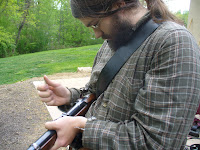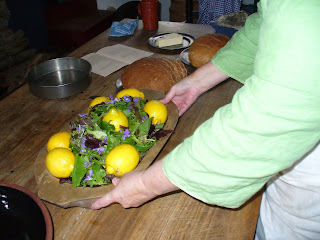The Neshaminy Event was gruelingly hot. Seagulls cawed
overhead while the smell of salt water wafted through our camps. As we bent
over our fire to heat water for cleaning dishes, we ladies could hear the low
rumbles of cannon fire and the sharp pops of rifles coming from the woods. The
sun was too hot so we agreed to forgo the dishes and dragged our chairs under
the shade of an oak tree. Too hot to move, we sat with our heads bowed in our
hot skirts wondering how the men were, in their wool coats, running in the
woods carrying their heavy guns and ammunition packs.
“They will
be miserable,” we groaned.
A little after all firing had ceased, the men stumbled into camp at a slight run. They dropped their packs and tore apart the meat we had for making sandwiches. Exhausted and excited the men reported that our company was finally large enough to be its own company and they did not have to join up with another one, a large feat!
 Andy then relayed
that he got to be acting corporal! A short-lived rise in the ranks, but a rise
nonetheless. :D I congratulated Andy and told him that I was happy about his
new position as it would also move up my ‘position’ in Civil War Era society.
Then I poured some water over his head. :D It was happily accepted.
Andy then relayed
that he got to be acting corporal! A short-lived rise in the ranks, but a rise
nonetheless. :D I congratulated Andy and told him that I was happy about his
new position as it would also move up my ‘position’ in Civil War Era society.
Then I poured some water over his head. :D It was happily accepted. We ended the night with a walk on the beach. There was a ball going on and we could hear the music, but those affairs are stuffy and boisterous. We sat on a bench overlooking the water and talked.
 We also
tried to make Soda Bread from this recipe. It was so hot out that even our
serving utensils and pans, nowhere near the fire were hurting our hands to
touch. We ended up burning it a little but the guys still devoured the whole of
it before marching off to fight. By the time I realized I should have taken a
picture of it, the bread was no more. It was a very fun event in a unique setting.
We also
tried to make Soda Bread from this recipe. It was so hot out that even our
serving utensils and pans, nowhere near the fire were hurting our hands to
touch. We ended up burning it a little but the guys still devoured the whole of
it before marching off to fight. By the time I realized I should have taken a
picture of it, the bread was no more. It was a very fun event in a unique setting.























